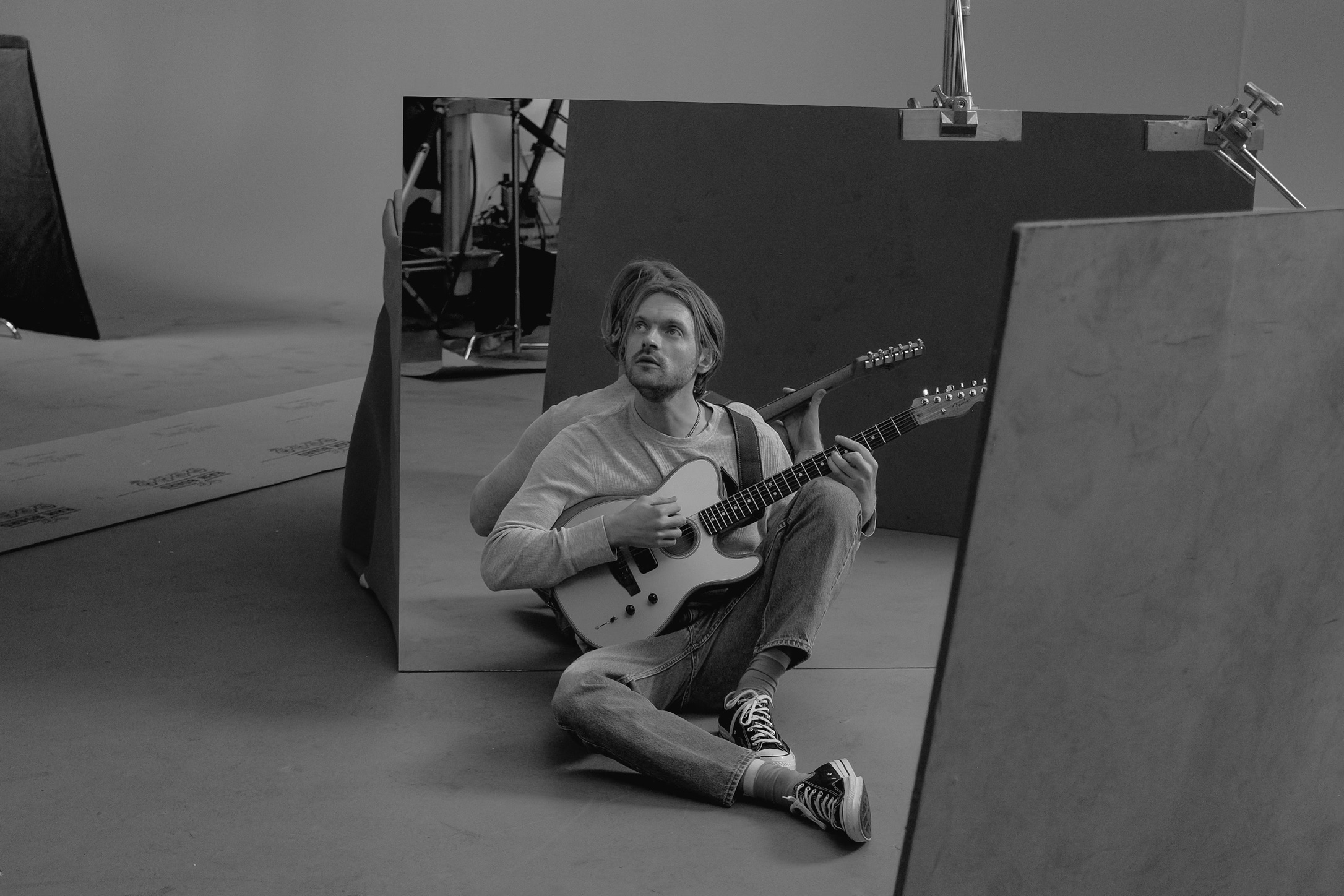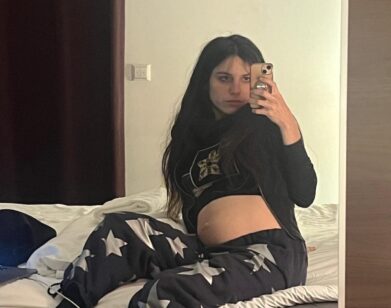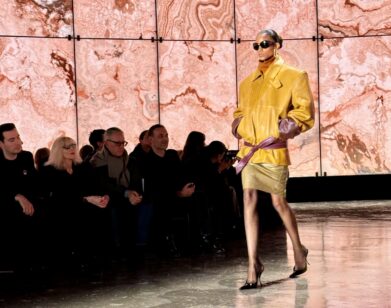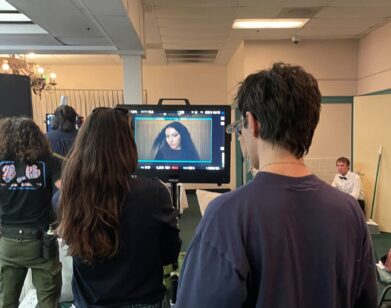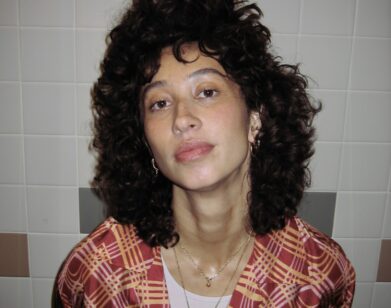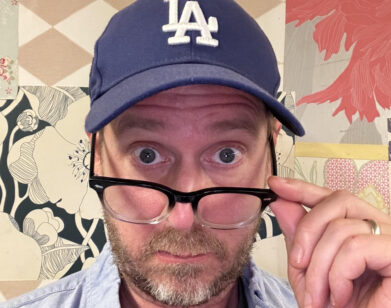POP
“You’re Super Loquacious”: Finneas, in Conversation With Louis Partridge
“I’ve been looking at your face for about a year and we’ve never met.” If that sentence sounds like it’s from a tender romance film, it’s probably because it was spoken by certified love song connoisseur FINNEAS. But in reality, it’s the first thing he said to actor Louis Partridge when the two met at Olivia Rodrigo’s birthday party some time ago. The 10-time Grammy winner (who’s also got two Academy Awards, in case you were counting) had just spent several months scoring Alfonso Cuaron’s newest limited series Disclaimer, in which Partridge stars as Jonathan Brigstock, the deceased lover of a journalist played by Cate Blanchett. Somehow, the hitmaker still managed to find the time to produce his sister Billie Eilish’s Grammy-nominated album, Hit Me Hard and Soft, not to mention his own sophomore album For Cryin’ Out Loud, which dropped last month. To celebrate its release, FINNEAS caught up with Partridge to talk about scoring sex scenes, music’s biggest pop girls, and the logistics of filming with the Paddington bear.—ARY RUSSELL
———
LOUIS PARTRIDGE: How are you doing, man? Cheers for inviting me to do this, by the way.
FINNEAS: Are you kidding? I’m so happy to talk to you and you’re so great in the show. It was a real treat to get to see your face for months.
PARTRIDGE: Right. We met for the first time at this party and you came up to me saying, “I’ve been looking at your face for about a year and we’ve never met.” And I don’t think I knew at the time that you were scoring the show.
FINNEAS: No, I mean, it wasn’t announced or anything. I remember talking to you for a while at that party and then saying happy birthday to Olivia [Rodrigo]. And she was like, “Oh, I saw you talking to Louis,” and I was like, “He did this amazing show and I scored it, Disclaimer.” And Olivia goes, “He said that almost all of his scenes are sex scenes in the show.” And I was like, “Yeah, pretty much. He does have some sex scenes in that show.”
PARTRIDGE: [Laughs] He does, yeah.
FINNEAS: Which is the fun. You’ve got to steel yourself. You’re like, “All right, here we go. We’re going to watch our loved one make love on screen.”
PARTRIDGE: There’s a separation required. I recently watched episode five with my grandma. I dread to think what she was thinking, but she steeled herself. She was very composed despite the subject matter.
FINNEAS: Well, I feel like you’re okay in episode five.
PARTRIDGE: I’m okay. There’s a bit of post-coitus fun, I think. But we’ll get on. Believe it or not, I’ve actually written some questions down.
FINNEAS: I have also, so we’re both very prepared.
PARTRIDGE: Oh, man. I thought this was a one-way street.
FINNEAS: No, it’s only fun for me if I get to ask you questions also.
PARTRIDGE: We’ll take turns. Congratulations on the album. When did it come out?
FINNEAS: Thank you. It came out on October 4th. And, probably as you’ve been doing for this show, the weeks of releasing something [involve] talking about it all the time. It’s been fun to live in it.
PARTRIDGE: Well, I love the album, man. I had the pleasure of listening to it on a walk by the beach and through some forests. It was a real treat. 40 minutes, the perfect length, with ups and downs. It’s just interesting that you can pore and pore over a song in Leonard Cohen’s style or you can just thrash something out and it could be the best thing you’ve ever done. That interplay is a constant source of trouble for songwriters, I imagine.
FINNEAS: Yeah, do you write in any capacity?
PARTRIDGE: I’ve been trying to tap into a bit of that. I always loved creative writing. I thought I had a good sense of vocabulary as a kid.
FINNEAS: You totally do. You’re super loquacious.
PARTRIDGE: Loquacious, look at that. Thank you. But I picked up guitar about a year-and-a-half ago and it’s been kind of my sole focus since then.
FINNEAS: Oh, that’s awesome.
PARTRIDGE: Yeah, I really love it. I listen to music constantly and I’m fascinated by songwriting. I have tried to write stuff. But I find that when you have a few ideas buzzing around, you don’t know whether to capture one and really expand on it or let that one go. How do you know when this is an idea that you want? Something that I glean from your album is just, man, you can fucking write a song.
FINNEAS: Thanks, man.
PARTRIDGE: A three-minute song takes you on a journey and wraps it up nicely. Just your ability to create a song was so apparent.
FINNEAS: That really means a lot. Yeah, there’s a craftsmanship to the songwriting world. Growing up, I was a big fan of bands, but as I got older, I got more into big pop albums like Britney Spears and Beyoncé and Lady Gaga. There’s a real dismissiveness in the world of pop songwriting. But there’s a leanness to it. You have to be writing something that has no fat. Everybody has to relate to it. So I’ve always respected the craft. On a good day, I feel like I’m trying to write a song that feels very concise. And then, there were days where I’m like, “The most valuable thing I can do today is just making the weirdest, strangest thing. And maybe later it’ll turn into something.” Even in scoring Disclaimer, I was getting outside of just writing songs with verses and choruses. I’m watching this long scene and trying to articulate whatever these characters are feeling through a couple of strings. It was like learning a different language or something. It was really fun.
PARTRIDGE: Yeah. On that note of pop music being dismissed as an art, do you feel like that’s changing at all with the rise of your Sabrina’s and Taylor’s and Charli’s? All of these albums have been going crazy recently. I feel like there’s been a real boom in the pop world.
FINNEAS: Yeah, I think every couple years there’s a shift in what the most popular sound is. I think there’s a hearkening back to a ’90s, 2000s thing right now that people miss, with a bunch of guitars and stuff. Olivia [Rodrigo]’s a part of this. And then, by contrast, there’s artists like Charli who are really at the forefront of some crazy production styles. So it’s a combo, but I think what I see is a lot of wit in the songwriting. That’s the thing that I’m the happiest about. The songwriting that I like the most is when I’m like, “Oh, there’s a cool joke in there,” or there’s a double entendre.
PARTRIDGE: Are you a more lyrical or melody, if you had to put yourself in one category?
FINNEAS: I think I’m a lyric guy. That being said, if the lyricist doesn’t have a voice I like to listen to, I can’t get past that. What about you?
PARTRIDGE: I’m melody first. I love it when I really look at lyrics and find out they’re expressing something, but when I listen to something, I’ll immediately build a world or attach it to a feeling.
FINNEAS: Do you make a character playlist at all? I’ve heard of this from some actors.
PARTRIDGE: Yeah. I used to be pretty diligent about that until I got real with myself and realized that I was just listening to songs that I wanted to hear and putting them under the name of the—
FINNEAS: And you’re pretending like, “Sid Vicious would love this.”
PARTRIDGE: Yeah. That was a fantastic musical. We should talk about Alfonso [Cuarón] as well. But Danny Boyle directed that and he loves music. He’s a music nut. I do think there’s something to be said for directors who have a real musical brain.
FINNEAS: Agreed.
PARTRIDGE: Or maybe it’s an ability to tap emotion. Was Alfonso like that at all?
FINNEAS: I mean, I think the whole reason I got the call has to do with how musical that guy is. He really is a student of classical music, but he loves modern stuff too. The only reason I know him is that he came to one of Billie’s shows years ago and was a fan of the music and gave me his number and we started sending each other playlists. He had cool taste and that was really the genesis of it. To that end, having him be really interested in music was really a boon.
PARTRIDGE: And he has a way of just stretching every single moment like he’s sucking sap from a tree, just making you feel the most uncomfortable feelings and having to sit with them. I noticed that in the music. The heartbeat while in the water scene, the string. It just goes on and on and on. When you think it’s done, there’s more. He’s just constantly taking you to a spot, like a composer with a massive orchestra.
FINNEAS: It’s really true.
PARTRIDGE: And you’ve got a great impression of Alfonso. I heard you doing it. You’re quite good at—
FINNEAS: Impressions.
PARTRIDGE: Just listening to interviews, you’re clearly an observer of people and things.
FINNEAS: I do a lot of impressions, but they’re only people I know. So there’s no “I’ll do the Governator,” or “I’ll do Christopher Walken.” And I mean, Alfonso’s got such a fun way of speaking. The calls we’d have about music… I’d be like, “How was your weekend?” He’s like, “It was dreadful.” He’s got such a colorful language. Sometimes, I find people for whom English is a second language will say things in an even more powerful way because they’re using a word that has a meaning for them.
PARTRIDE: Right.
FINNEAS: It’s so funny. I have some questions for you, though.
PARTRIDGE: You do?
FINNEAS: Yeah, I do. What is Paddington?
PARTRIDGE: Paddington is an ideology.
FINNEAS: When you’re on set with Paddington Bear, what is it? Is it a guy in a motion capture suit? Is it a ball on a stick? What is it?
PARTRIDGE: I feel like I’ve got a big old secret here. I don’t know whether I’m at liberty to explain this.
FINNEAS: I bet Interview mag will cut this if Paddington Corp doesn’t want you to say it.
PARTRIDGE: Well then, between you and I and possibly the rest of the world, they had a little person, an actress who was about four-foot something.
FINNEAS: Paddington height.
PARTRIDGE: Yes, walking alongside for eyeline. And then they had a Paddington head on a stick. They would wheel that in when needed.
FINNEAS: What a luxury to have an actress there. I mean, that always seems like the big CGI challenge, that somebody like you has to go off of nothing.
PARTRIDGE: Yeah, it’s tough. Often you’re looking at little bits of tape on a camera or tennis balls.
FINNEAS: No fun.
PARTRIDGE: It’s peculiar. That’s when you really have to summon something. Dig deep.
FINNEAS: What about the Volume, that’s like a room of TV? You know what I’m talking about? Like, the Star Wars room?
PARTRIDGE: Yes. I have been in one of those for Disclaimer, actually. The opening train scene.
FINNEAS: No way.
PARTRIDGE: It was on an ARI sound screen. It’s sort of a curved, massive screen and the picture looks disjointed, but somehow it works when put together. That was taken by somebody on a train filming out the window, then they played that footage over. During the bit where I orgasm, it goes into the tunnel, which was a nice little metaphor of something.
FINNEAS: Sure. And the Disclaimer shoot to my knowledge was forever. It was like months and months.
PARTRIDGE: A chunk of my life.
FINNEAS: Yeah. And because of that, was there any like, “I’ve got to keep my hair this exact length for the continuity of it?”
PARTRIDGE: Luckily, you have other people worrying about that for you. I guess just don’t get a face tattoo or do anything drastic.
FINNEAS: Break your nose.
PARTRIDGE: I went traveling to Thailand, two months off. I went on my own and actually wore the same shorts that my character wears, so it felt very meta. I wasn’t sleeping with any other women, try as I might.
FINNEAS: That’s so funny.
PARTRIDGE: I forgot to say, I first saw you at your tour at the O2. I couldn’t believe it, man. You came out on a stool and essentially did an acoustic set. I think, in England? That’s incredible.
FINNEAS: It was really fun.
PARTRIDGE: As a performer, are you noticing a difference between a 500-seat venue and a 50-seat venue? When you’re on your stool, are you in your own world or are you thinking, “Damn, I wish I could see all these people”?
FINNEAS: I’ve noticed less of a difference as Billie’s accompanist. I’m spotting her. I feel a little like a guy holding a crash pad for a gymnast or something. I’m playing guitar and looking right at her eyes and mouth and making sure that I’m playing in time with her. I’m not paying as much attention to the crowd as I am to her. But, for her, I’m sure it’s very different. Just psychologically, I’ve been at a bunch of her shows these last couple weeks and humans aren’t really equipped for it.
PARTRIDGE: Wild. I’ve just looked it up quickly. “Sonder, the realization that each random passerby is living a life as vivid and complex as your own.”
FINNEAS: Isn’t that a nice word?
PARTRIDGE: Yeah.
FINNEAS: But that’s what I think about. I think about it at an airport. I think about it at a sports event. I’m just like, “Damn, there’s a lot of people.” Have you done theater?
PARTRIDGE: I came very close to doing theater recently and it didn’t happen. It’s not something I’ve ever done, so I’d be very nervous. I’m not great at just speaking in front of people, but I’m keen to confront that.
FINNEAS: I suppose the difference is that a lot of theater’s ignoring the audience. It’s like, I’m having this scene with this person, but I think being a musician is engaging as much as possible with an audience. I often joke that I remember all my lyrics until I have a meaningful moment with an audience member, and then I forget. Because when I’m looking at a young person singing them back to me or crying or whatever it is, I get so connected.
PARTRIDGE: Yeah, I have a parallel thing in acting. You fall down the rabbit hole and you’re looking in someone’s eyes, so you forget the fucking line. It’s beautiful, but it’s terrifying and annoying. Do you enjoy touring? I know you are taking For Cryin’ Out Loud on tour soon.
FINNEAS: I’m doing it in a fun way. I’m bringing a bunch of my really close friends out on the road. Tours are probably very similar to going job to job as an actor. It can feel very nomadic. There’s a lot of times where you’re alone on planes and in hotel rooms alone and trailers. Especially in acting and modeling, you get on a plane to a set full of strangers and make those really close friends for three months, and then they go off to shoot another job for a year in New Zealand and you go off and shoot a job in Atlanta and you’re like, “I loved that person, but we’re not going to see each other for months and months.” Have you been able to keep those people in your life or has it been really hard?
PARTRIDGE: I’m quite a sociable person, but at some point, you’ve got to be honest with yourself. It sounds like I’m the most popular person in the world, but I can’t be a good, honest friend to this many people. I’d rather have four friends that I really give my complete time to. But I love the idea of sharing three months with someone and then not really seeing them again. That doesn’t bother me so much.
FINNEAS: Okay. I have some rapid-fire questions for you.
PARTRIDGE: I was just about to say that I do too.
FINNEAS: All right. What do you think of method acting?
PARTRIDGE: It would be difficult to sum up in rapid-fire. We’ll do slow, sluggish fire.
FINNEAS: Method acting, good or bad?
PARTRIDGE: I think whatever works for you, as long as it isn’t infringing on another person’s life. If it helps you kid yourself into thinking that you are this person, then that’s brilliant. But don’t be stepping on other people’s toes.
FINNEAS: That’s a great answer.
PARTRIDGE: Thank you. Which song do you wish you wrote?
FINNEAS: “Creeks” by Bon Iver. I think that song is crazy. I was told recently by a friend of mine—maybe this isn’t true—that he just improvised it and I was like, “Damn, that’s crazy,” because I love that song.
PARTRIDGE: I was listening to Astral Weeks recently. Guy was 22. Unreal. Somehow improvised.
FINNEAS: That’s crazy.
PARTRIDGE: I know For Crying Out Loud was also a bit free-flowing.
FINNEAS: Yeah, it was pretty fast. We did it over 14 days. It wasn’t improvised, but I would write a song a day. It’s a fun way to do it. I had all this help. I had so many people in the room with me playing guitar and bass.
PARTRIDGE: I think it comes across.
FINNEAS: That’s awesome.
PARTRIDGE: I love “Little Window,” man. It was clearly about something, but then there was a relationship in the periphery that you don’t know about and can map onto your own. I thought it was really moving.
FINNEAS: What a sweet thing to say. That means a lot. Is there a historical or pop culture figure that you would like to play?
PARTRIDGE: Yes. I wanted to get a film made about Nick Drake. I read his biography, fascinating life. Man, I could talk and talk. He just did his own thing in a sort of a Van Gogh way, with no one ever having shown him any love. There’s one fellow who believed in him, his producer. It’s just such a touching story. I’d love to play Nick Drake.
FINNEAS: You can play Nick Drake. You’re, like, more handsome than Nick Drake, but that’s okay. That’s the Hollywood way. And he died at 26, so you got a couple of years.
PARTRIDGE: Yes. I wrote them a letter, the estate, and they said they wouldn’t support the use of the music, which is a shame.
FINNEAS: Give it a couple of years. Make them watch Disclaimer. You put it together as a producer and get a screenwriter and director on board that they love, you can make it happen. I also think that, to me, an interesting biopic is a person we know too little about. When I watch a biopic of somebody that is the most famous musician, it’s fun, but really I’m interested in somebody I’m much less familiar with.
PARTRIDGE: What book would you recommend to anyone?
FINNEAS: Ooh. I’ve been recommending a book called Acid for the Children for years, which is Flea’s [of Red Hot Chili Peppers] memoir. I’m a big rock biography guy. But I also was recommended a book by my friend Alexis called Milk Fed, by the author Melissa Broder. Milk Fed blew my brain out of my skull. It’s a novel, but it reads like a memoir. In fact, when I was first reading it, I thought it was an autobiography because I was like, “This has to be this person’s life experience.” It’s written so convincingly.
PARTRIDGE: That’s what I’m taking away from today.
FINNEAS: Check it out. Last question is, when are you going to star in one of Olivia’s music videos?
PARTRIDGE: When they can reach my budget.
FINNEAS: When they can afford you. I was hoping you’d say that.
PARTRIDGE: I’m an expensive guy these days.
FINNEAS: That’s a good response.
PARTRIDGE: My last question is, if you could see any musician or band, living or dead, in concert, who would it be?
FINNEAS: Beatles at the Bowl would be crazy.
PARTRIDGE: Beatles at the Bowl.
FINNEAS: There was a tour before they made In Utero where the [Red Hot] Chili Peppers and Nirvana toured together as a doubleheader. That would’ve been really crazy.
PARTRIDGE: Wow. Do they do that still?
FINNEAS: Troye Sivan and Charli XCX just did a doubleheader. Obviously, Nirvana and the Peppers could each sell out three arenas. Chappell [Roan]’s been having a year like that, where she’s been playing shows way smaller than she could because they were booked months ago. Such a cool experience to be at those shows.
PARTRIDGE: I had the chance. I’ve probably been at about 25 of Olivia’s concerts and I could have seen Chappell every one of those times. I couldn’t believe it.
FINNEAS: But I’ve opened for tons of shows and nobody ever saw my set except super fans of the artist. You roll in at the last minute through a back entrance and you sneak out in the audience in a hat. Otherwise, it’s too chaotic.
PARTRIDGE: Of course, I’m backstage giving Olivia her pep talk.
FINNEAS: Exactly. What a treat to talk to you, Louis. I look forward to seeing you in the flesh again.
PARTRIDGE: Thank you for asking me to do this, man. I had a lot of fun.
FINNEAS: Peace, bro.

